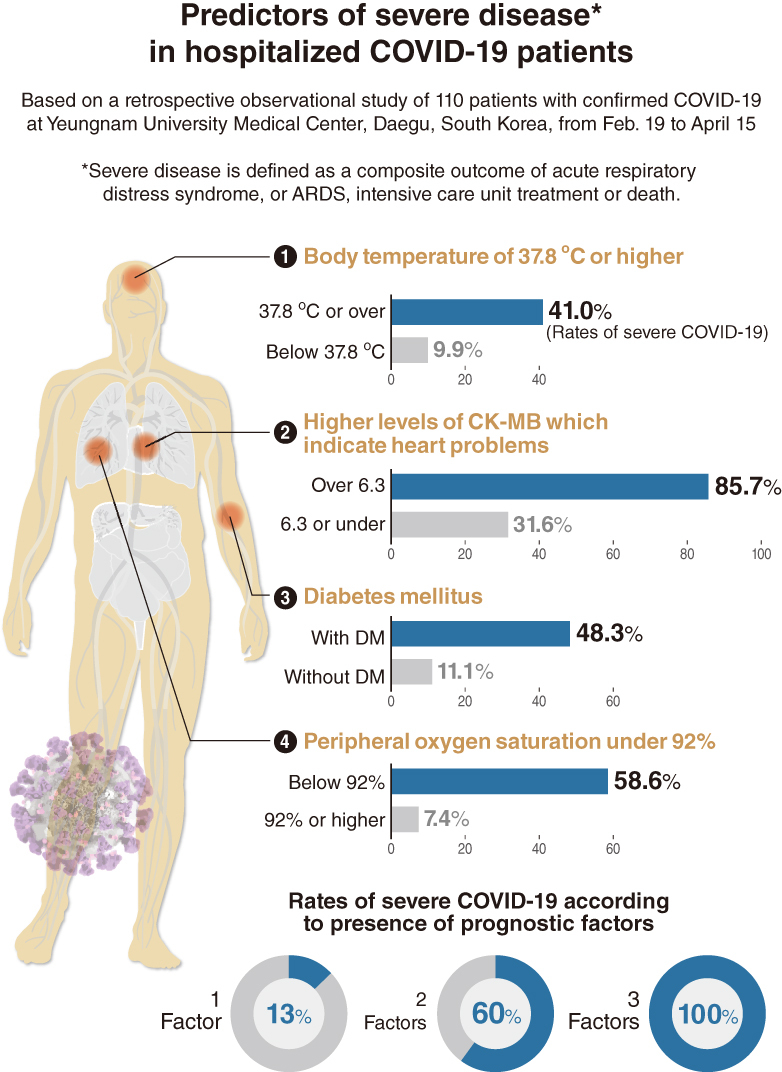 |
(The Korea Herald) |
Certain markers may help predict a patient’s chance of developing a severe case of novel coronavirus disease at the point of hospital admission, according to a Korean study published last week.
This is a first local study identifying risk factors for severe COVID-19 caused by the new coronavirus, SARS-CoV-2. The findings were based on observations of 110 confirmed patients hospitalized between Feb. 19 and April 15 at Yeungnam University Medical Center in Daegu -- a city accounting for 57.8 percent of the country’s total 11,902 cases.
The study shows having diabetes, high body temperatures, low oxygen saturations and increased levels of cardiac enzymes indicating heart damage are independent factors associated with COVID-19 severity.
“Identifying the prognosis factors linked to severe COVID-19 at the time of hospitalization can allow for more careful monitoring of patients in whom the factors are present,” pulmonologist Dr. Ahn June-hong, who led the study, told The Korea Herald.
“The predictors will be helpful in providing timely interventions for high-risk patients, which may lead to reduction in fatality rate.”
More specifically, patients with diabetes mellitus, body temperatures of 37.8 degrees Celsius or higher, peripheral oxygen saturation lower than 92 percent or creatine kinase MB levels above 6.3 were prone to become severely ill with the virus, the study found.
Rates of severe COVID-19 in patients with one of the factors was 13 percent, two factors 60 percent and three or four factors 100 percent.
Pulmonologist Dr. Chun Eun-mi of Ewha University Medical Center in Seoul said low oxygen saturation in a patient means the disease has already progressed.
“In healthy persons, the oxygen saturation measures greater than 95 percent,” she said.
Because the coronavirus invades human cells by binding to receptors known as the ACE2, which are plentiful in the lungs as well as the heart, biomarkers of cardiac injury can be used to assess likelihood of severe COVID-19, said cardiologist Dr. Kim In-cheol.
Kim, of Daegu’s Keimyung University Dongsan Hospital treating severe COVID-19 patients, said elevated CK-MB levels, whose normal range is typically thought to be below 5, suggest heart damage.
“Organs expressing the ACE2 receptors are vulnerable to the coronavirus infections,” he said. “Among them are the lung, the heart, the digestive tract and the kidneys.”
The patients included in the research were all adults 18 years or older. Their average age was 56.9 years, and 56 percent of them were women. The study also said patients in the severe group were significantly older than those in the non-severe group and more likely to be diabetic.
The study defined severe disease as a composite outcome of acute respiratory distress syndrome, intensive care unit treatment or death.
By Kim Arin (
arin@heraldcorp.com)




![[Herald Interview] 'Trump will use tariffs as first line of defense for American manufacturing'](http://res.heraldm.com/phpwas/restmb_idxmake.php?idx=644&simg=/content/image/2024/11/26/20241126050017_0.jpg)


![[Health and care] Getting cancer young: Why cancer isn’t just an older person’s battle](http://res.heraldm.com/phpwas/restmb_idxmake.php?idx=644&simg=/content/image/2024/11/26/20241126050043_0.jpg)
